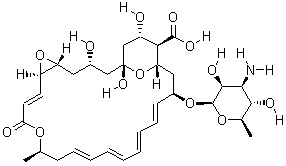 CN
China Suppliers > chinanisin >
CN
China Suppliers > chinanisin > year
| 111Category: | Food and Feed additives/Food additives |
|
|
| CAS NO: | 7681-93-8 | ||
| EC NO: | 231-683-5 | ||
| Molecular Formula: | C33H47NO13 | ||
| Molecular Weight: | 665.7252 | ||
| Specification: | |||
| InChI: | InChI=1/C33H47NO13/c1-18-10-8-6-4-3-5-7-9-11-21(45-32-30(39)28(34)29(38)19(2)44-32)15-25-27(31(40)41)22(36)17-33(42,47-25)16-20(35)14-24-23(46-24)12-13-26(37)43-18/h3-9,11-13,18-25,27-30,32,35-36,38-39,42H,10,14-17,34H2,1-2H3,(H,40,41)/b4-3+,7-5+,8-6-,11-9+,13-12+/t18-,19-,20+,21+,22+,23-,24-,25+,27-,28+,29-,30+,32?,33-/m1/s1 | ||
| Product description: Physical characteristic: Natamycin is a white to yellow flavourless, odourless crystalline powder. It is very stable with its crystal form. The solubility of Natamycin is very low in water and in most organic solvents. Only 50mg Natamycin can be dissolved in pure water at room temperature. The low solubility makes it very suitable for use on the surface of food. Natamycin will stay on surface of food, where most moulds and yeasts may grow, but does not influence the natural course of fermentation inside. Chemical characteristic: As seen from the molecular structural, Natamycin is polyene macrolide antimycotic. But it is very sensible to oxidation and ultraviolet radiation. Microbiological characteristic: Natamycin can hinder almost all the fungi (moulds and yeasts), but could not result in bacteria, virus or other microorganism. The activation and stability: Many factors can influence the stability of Natamycin: acidity (PH value), temperature, light, oxygen, heavy metal, etc. Usage: Food preservative. Ideal result can be achieved by using Natamycin on the exposed surface of the food where the moulds and yeasts may grow. This is especially useful for cheese manufacture, since the mould growth is prevented, while the cheese ripening bacteria will grow and metabolize normally. The product should be stored in dry, cool (not exceeding 15℃ ) places, in original sealed container, and prevent from direct sunlight. Application standard: 1. U.S.A.: FDA, § 172. 155, 2000: Treat (Spray or dip) the surface of the cheese with 200-300mg/kg aqueous solutions. 2. EU: Permitted on the surface of cheese and sausage casings 3. China: GB2760-2001: for cheese, meat and meat products, moon cakes, snacks, raw juice for coating use, surface of utensils, perishable food, Salad sauce, Fermented wine, etc. The FAO/WHO Joint Expert Committee on Food Additive confirmed the acceptable daily intake (ADI) if Natamycin as 0.3mg/KG (total body weight). This was also endorsed by the EU. In China its use is permitted in the food industry. |
|||
| Synonyms: | Pimaricin, Streptomyces chattanoogensis (1.07360);Natamycin;Pimaricin;22-[(3-amino-3,6-dideoxy-beta-D-glycero-hexopyranosyl)oxy]-1,3,26-trihydroxy-12-methyl-10-oxo-6,11,28-trioxatricyclo[22.3.1.0~5,7~]octacosa-8,14,16,18,20-pentaene-25-carboxylic acid;(1R,3S,5R,7R,8E,12R,14E,16E,18E,20E,22R,24S,25R,26S)-22-[(3-amino-3,6-dideoxy-beta-D-mannopyranosyl)oxy]-1,3,26-trihydroxy-12-methyl-10-oxo-6,11,28-trioxatricyclo[22.3.1.0~5,7~]octacosa-8,14,16,18,20-pentaene-25-carboxylic acid;(8Z,14Z,16Z,18Z,20Z)-22-[(3-amino-3,6-dideoxyhexopyranosyl)oxy]-1,3,26-trihydroxy-12-methyl-10-oxo-6,11,28-trioxatricyclo[22.3.1.0~5,7~]octacosa-8,14,16,18,20-pentaene-25-carboxylic acid;(1R,3S,5R,7R,8E,12R,22R,24S,25R,26S)-22-[(3-amino-3,6-dideoxy-D-mannopyranosyl)oxy]-1,3,26-trihydroxy-12-methyl-10-oxo-6,11,28-trioxatricyclo[22.3.1.0~5,7~]octacosa-8,14,16,18,20-pentaene-25-carboxylic acid;natamycin sterile; | ||
| Molecular Structure: |
 |
||